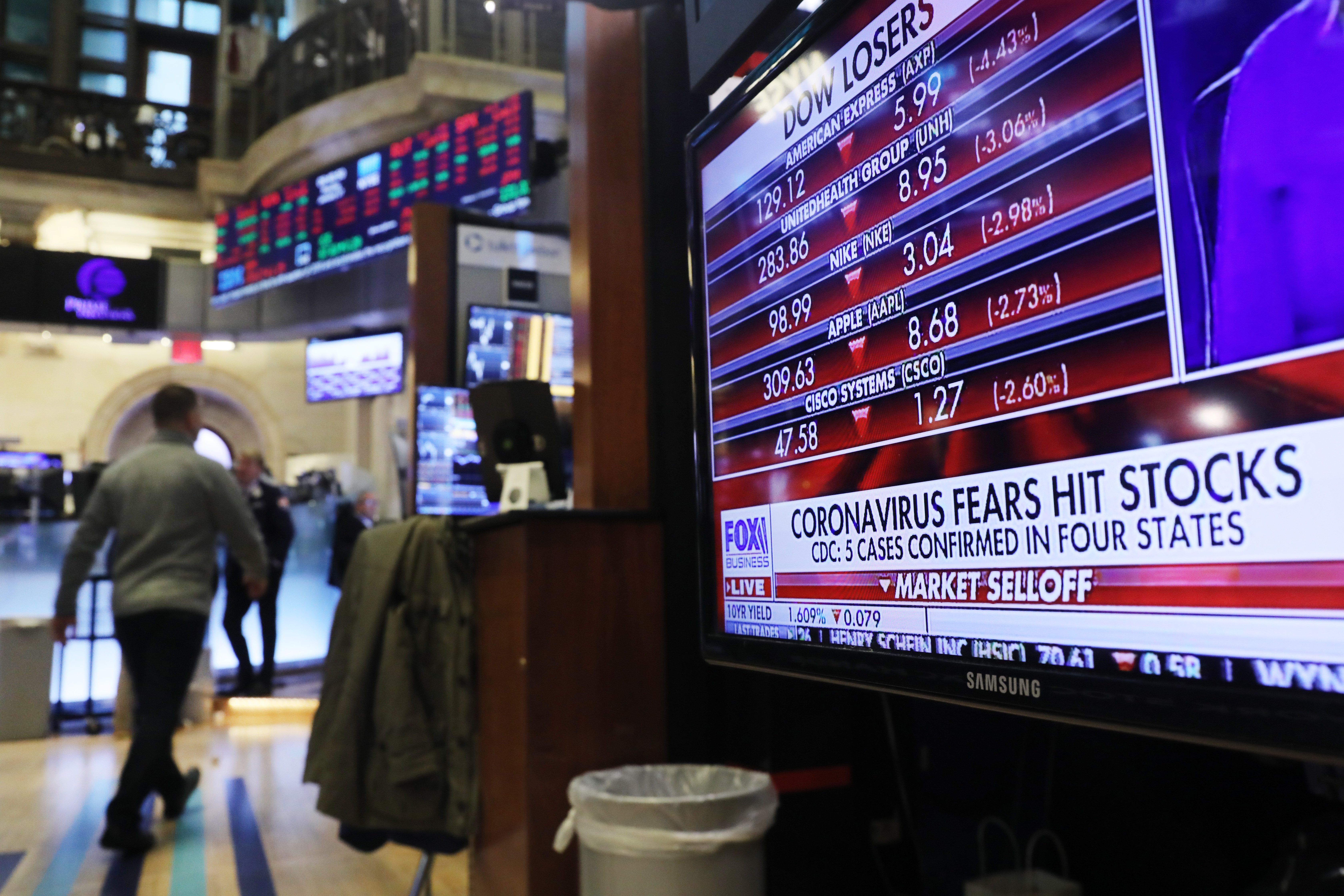How the coronavirus epidemic threatens global growth
Is a recession looming?

A free daily email with the biggest news stories of the day – and the best features from TheWeek.com
You are now subscribed
Your newsletter sign-up was successful
The COVID-19 epidemic has walloped the stock market to a degree not felt by investors since the financial crisis, said Fred Imbert and Eustance Huang at CNBC. The Dow dropped more than 3,500 points last week, or 12 percent, while the S&P 500 fell 11.5 percent in the market's worst five-day skid since 2008. Stocks staged a rally on Monday but then swooned again as more companies, including Microsoft, "issued earnings and revenue warnings." This week, the Federal Reserve took the extraordinary step of making an emergency cut in its benchmark interest rates, but the move failed to stop the market's slide. The fast-moving virus poses a crucial test for the 11-year bull market, which "has survived an unprecedented trade war, a catastrophic tsunami in Japan, and a severe crash in oil prices," said Matt Egan at CNN. Consumer spending has kept the U.S. economy afloat during the trade war with China, which weakened the global economy. With Americans preparing to hunker down, Moody's chief economist estimated the odds of a recession in the first half of 2020 at 40 percent.
"Economists say a pandemic could clearly cause a recession in the United States," said Ben Casselman at The New York Times, but we're not there yet. The damage from the epidemic has mainly hit factories and supply chains, causing a short-term drop in production and sales. Consumer buying can snap back from those kinds of shocks — just as natural disasters tend to be followed by a burst of rebuilding. "So far, the coronavirus outbreak looks more like a hurricane than like a financial crisis — but that could change quickly." This feels like a panic, said Marcus Ashworth at Bloomberg. The stock market's bull run has also been "long overdue" for a correction "that has been delivered all at once." Markets will eventually rationalize the severity of the outbreak "and accept that the world can get back to business."
It's not that simple, said Thomas Gryta and Russell Adams at The Wall Street Journal. The coronavirus is a different menace — a two-headed monster that's "rapidly hitting supply and demand." The outbreaks in Asia and Europe have stalled factories "that churn out everything from smartphones to pharmaceuticals." And on the consumer side, air travel and tourism won't just snap back; many plans have simply been canceled. This was supposed to be the year of a global rebound, after a stagnant 2019 for most of the world's economies, said Eswar Prasad at The New York Times. Now those rosy forecasts are obsolete. "Coronavirus has put the world economy in survival mode."
The Week
Escape your echo chamber. Get the facts behind the news, plus analysis from multiple perspectives.

Sign up for The Week's Free Newsletters
From our morning news briefing to a weekly Good News Newsletter, get the best of The Week delivered directly to your inbox.
From our morning news briefing to a weekly Good News Newsletter, get the best of The Week delivered directly to your inbox.
A "coordinated effort" from the Federal Reserve and other central banks could help the world economy pull through, said Jesse Pound at CNBC. Goldman Sachs' chief economist says he expects that the damage from the coronavirus "stops just short of a global recession." But investors need to be realistic about what the Fed can do, said Josh Barro at NYMag. Low rates aren't going to counteract the factory closures, nor are they going to "induce people to go to the mall." Rather, "the most important role the central banks play will be after the epidemic passes," digging the world out from under the economic fallout.
This article was first published in the latest issue of The Week magazine. If you want to read more like it, try the magazine for a month here.
A free daily email with the biggest news stories of the day – and the best features from TheWeek.com
-
 ‘Poor time management isn’t just an inconvenience’
‘Poor time management isn’t just an inconvenience’Instant Opinion Opinion, comment and editorials of the day
-
 Bad Bunny’s Super Bowl: A win for unity
Bad Bunny’s Super Bowl: A win for unityFeature The global superstar's halftime show was a celebration for everyone to enjoy
-
 Book reviews: ‘Bonfire of the Murdochs’ and ‘The Typewriter and the Guillotine’
Book reviews: ‘Bonfire of the Murdochs’ and ‘The Typewriter and the Guillotine’Feature New insights into the Murdoch family’s turmoil and a renowned journalist’s time in pre-World War II Paris